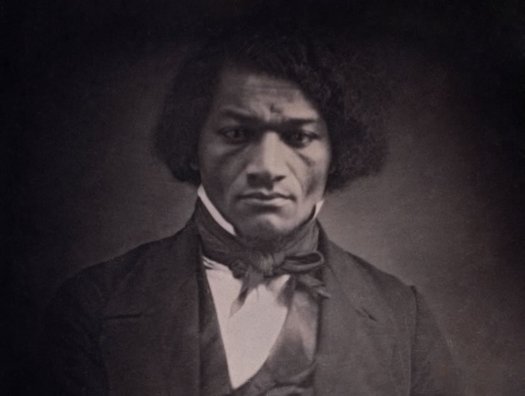Frederick Douglass on the Albany of 1847

A daguerrotype of Frederick Douglass from around the time he visited Albany in 1847, when he was 29 years old. / photo: National Portrait Gallery via Wikipedia
In the fall of 1847, the great abolitionist and orator Frederick Douglass had traveled to Albany (and Troy) for a series of meetings and speeches. And while Douglass found a few things here to praise -- it's fair to say he came away rather unimpressed by the city of Albany, which at the time was a key center for politics and transportation.
From a letter Douglass wrote to the abolitionist Sydney Gay in October of that year after leaving the city:
Situated on the banks of the noble Hudson, near the head of navigation, Albany is the grand junction of eastern and western travel. Its people have a restless, unstable, and irresponsible appearance, altogether unfavourable to reform. A flood of immorality and disgusting brutality is poured into the city through the great Erie Canal, and the very cheap travel on the Hudson facilitates the egress of a swarm of loafers and rum-suckers from New York. I have received more of insult, and encountered more of low black-guardism in the streets of this city in one day than I should meet with in Boston during a whole month.
There's a larger clip from the letter after the jump -- in it Douglass touches on the history of slavery in Albany and the city's apparent inertia in the face of reform.
This clip is from a letter included in The Frederick Douglass Papers: 1842-1852, published by Yale University Press:
Like most other metropolitan towns and cities, Albany is by no means remarkable for either the depth or intensity of its interest in reform. No great cause was ever much indebted to Albany for assistance. Many reasons might be given, accounting for the tardiness of its people in matters of reform in general, and Anti-Slavery reform in particular. I believe that many of its wealthiest and most influential families have either been slaveholders, or are connected with slaveholders by family ties, and it is not too much to presume that they have not been entirely purified and cleansed of the old leaven. Their influence is yet visible on the face of this community.
"The evil that men do lives after them." Thirty years ago, and slaves were held, bought and sold, in this same goodly city; and in the darkness of midnight, the panting fugitive, running from steeples and [d]omes, swam the cold waters of the Hudson, and sought a refuge from Albany man-hunters, in the old Bay State. The beautiful Hudson as then to the slaves of this State, what the Ohio is to slaves in Virginia and Kentucky. The foul upas has been cut down for nearly thirty years, and yet its roots of poison and bitterness may be felt in the moral soil of this community, obstructing the plough of reform, and disheartening the humble labourer. Many efforts have been made to awaken the sympathies, quicken the moral sense, and rouse the energies of this community in the Anti-Slavery cause -- but to very little purpose. many of the best and ablest advocates of the slave, including George Thompson, of London, have wrought here, but apparently in vain. So hard and so dead are its community considered to be, our lecturers pass through it from year to year without dreaming of the utility of holding a meeting in it; all are disposed to think Slavery may be abolished in the United States without aid of Albany. Like Webster, of New Hampshire, they think this a good place to emigrate from.
Situated on the banks of the noble Hudson, near the head of navigation, Albany is the grand junction of eastern and western travel. Its people have a restless, unstable, and irresponsible appearance, altogether unfavourable to reform. A flood of immorality and disgusting brutality is poured into the city through the great Erie Canal, and the very cheap travel on the Hudson facilitates the egress of a swarm of loafers and rum-suckers from New York. I have received more of insult, and encountered more of low black-guardism in the streets of this city in one day than I should meet with in Boston during a whole month.
The whole letter is worth reading. Douglass writes about the press in Albany, and in the influence of state government, and a few of the people he met.
Bonus link: Here's an account written by Douglass for The North Star about visiting Saratoga County in 1849. [Brookside Museum]
Hi there. Comments have been closed for this item. Still have something to say? Contact us.
Comments
explains a lot of the way I feel RIGHT NOW
... said jaketwiceover on Feb 1, 2016 at 7:06 PM | link
A nice little podcast that mentions Douglass and the role of Albany/Troy in the Abolitionist and Women's Rights movements. http://www.missedinhistory.com/podcasts/the-road-to-the-declaration-of-sentiments/
... said Deanna Fox on Feb 1, 2016 at 10:21 PM | link
I would have to agree with Mr. Douglass, most of the time our citizens do indeed have a restless, unstable, and irresponsible appearance.
A friend from France once remarked that it seemed that everyone in Albany had just or was about to mow a lawn or partake in some other equally laborious activity.
... said Cyril on Feb 2, 2016 at 10:50 AM | link